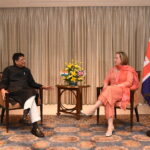Israel and the ethics of trade policy

By: Arthur West & James Dippie (Global Justice Ayrshire)
Date: February 2024
Trade is fundamental to international financial and economic well being.
The conditions and rules of trading arrangements make a huge contribution to the well being of the populations of trading partners.
In today’s troubled and unequal world it is vital that there is some consideration of ethics in relation to international trading arrangements.
A particular example which highlights the need to have an ethical dimension is the UK’s trade with Israel.
Latest figures suggest more than 29,000 civilians have been killed by the Israeli army in Gaza since the siege began last year. Oxfam recently reported that 250 Palestinians were being killed every day – a higher death rate than any other major conflict in recent years
Over a number of years Israel has been supplied with arms and heavy plant machinery which has been used by the Israeli authorities to impose cruel and spiteful treatment on the Palestinian people. This treatment has included killing and injury of civilians often as a result of illegal settler attacks.
Other forms of ill treatment include the detention of children through a military court system and the demolition of Palestinian homes, schools and hospitals.
In February 2022 Amnesty International issued a detailed report which concluded that violations carried out by Israeli authorities constituted the imposition of a system of apartheid.
In a nutshell the current loss of lives and destruction in Gaza and the occupied West Bank is fuelled by weaponry and machinery imported in large part from the US and UK.
The current situation in relation to Gaza represents a flagrant breach of human rights and international law.
As Nick Dearden, Director of Global Justice Now has said, as Israel continues to violate international law – with the International Court of Justice recently ruling that Israel’s current actions in Gaza could amount to genocide – by continuing to sell weapons to Israel at this time, Britain is clearly in violation of its own international legal obligations.
Campaign Against the Arms Trade (CAAT) says that, since 2015, the UK has licensed at least £482 million of arms sales to Israel. This includes £146 million in direct arms sales from the UK. And it also includes military equipment like components for F-35s – in the words of its producer Lockheed Martin “the most lethal… fighter jet in the world” – which are currently being used to destroy Gaza. Around 15% of the F-35 is produced in the UK, and CAAT estimates these sales to be worth another £336 million since 2016.
In Scotland, there are two factories making parts for the F-35 fighter jets that are being supplied to Israel, and two other factories of companies that make parts for F-35 fighter jets that are being used to bombard Gaza. These are Leonardo UK and Darchem Engineering in Edinburgh, BAE Systems in Govan and Scotstoun, and Raytheon in Glenrothes. See CAAT’s interactive map here.
It really is time for the UK to stop hosting massive arms fairs such as the biennial Defence and Security Equipment International or DSEI arms fair, among others – and start prioritising efforts to control the arms trade.
It is also time for individuals and organisations to think about raising awareness about the place of ethical trading arrangements in bringing about a more peaceful world and just world – particularly for the Palestinian people.
It seems that the following ideas are worth looking at by individuals and organisations who are interested in helping to make a better world possible:-
1 Giving support to CAAT – the Campaign Against the Arms Trade – in its work to stop Arms Fairs and end UK Government involvement in the Arms Trade.
As well as donating you could also support the campaign by: joining demos outside factories making F-35 fighter jets in Scotland. And by writing to the Scottish government about their support of arms manufacturers in Scotland through Scottish enterprise.
2 Support a personal shopping boycott of Israeli goods until the Israeli Government ends its cruel and heartless treatment of the Palestinian people.
3 Pressurise the UK Government to suspend current trading agreement negotiations with Israel until there is a clear and meaningful commitment to discontinue illegal settlement building and violence towards the Palestinian people.
4 Carefully monitor the work of the UK Government in relation to post Brexit deals to ensure that ethical and human rights considerations are not ignored in any negotiations.
 Previous Post
Previous Post